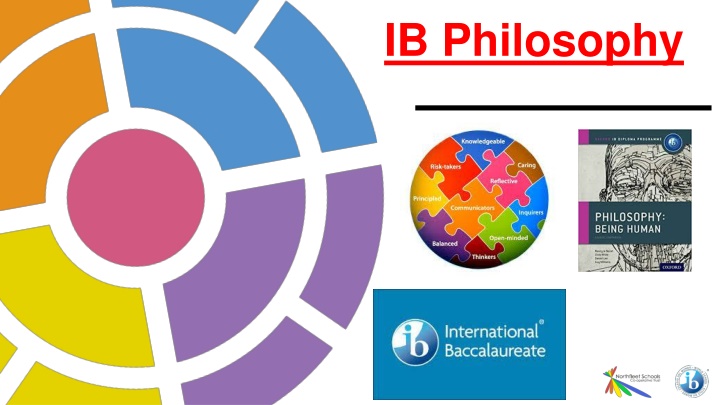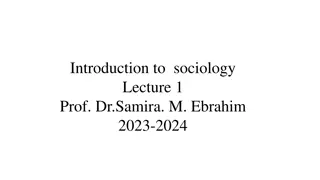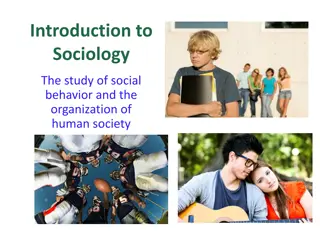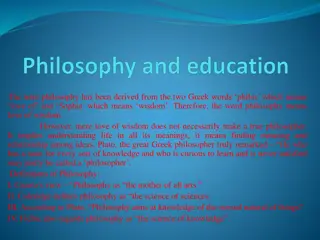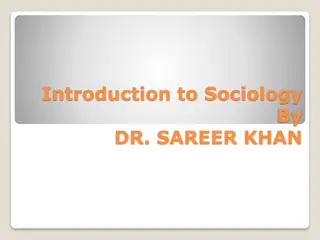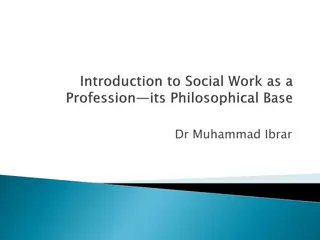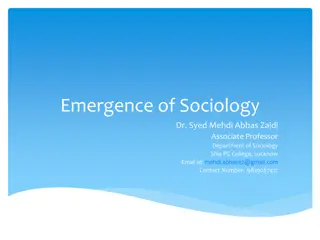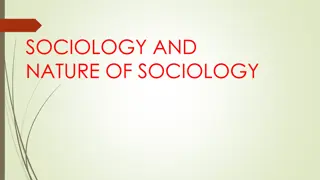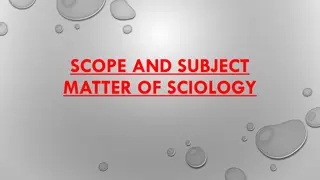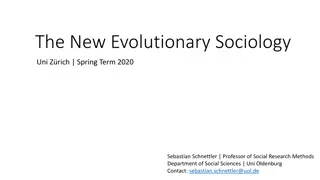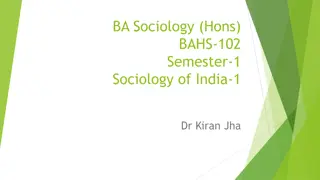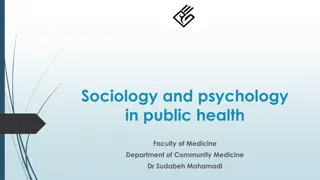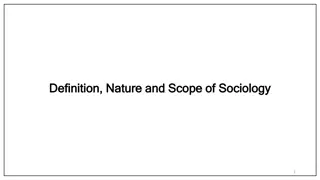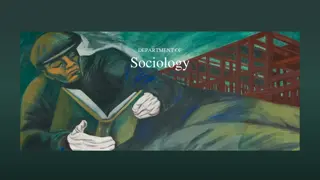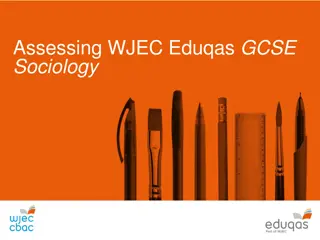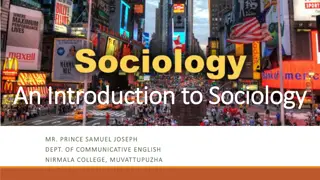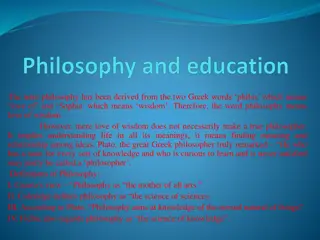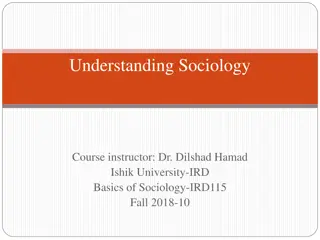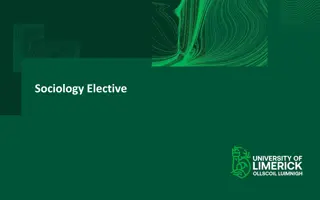Exploring the World of Sociology through Philosophy
This philosophy course delves into engaging with influential thinkers, encouraging students to actively participate in philosophical activities. Covering topics on being human, ethics, religion, philosophical texts, and contemporary issues, it also emphasizes internal assessments and stimulating intellectual curiosity. Supporting activities include trips to conferences, guest speakers, and additional reading, with expectations of preparation, homework completion, and transferable skills development from KS4/GCSE.
Download Presentation

Please find below an Image/Link to download the presentation.
The content on the website is provided AS IS for your information and personal use only. It may not be sold, licensed, or shared on other websites without obtaining consent from the author.If you encounter any issues during the download, it is possible that the publisher has removed the file from their server.
You are allowed to download the files provided on this website for personal or commercial use, subject to the condition that they are used lawfully. All files are the property of their respective owners.
The content on the website is provided AS IS for your information and personal use only. It may not be sold, licensed, or shared on other websites without obtaining consent from the author.
E N D
Presentation Transcript
IB Philosophy In your groups, make up a definition of Sociology. nxnxnxbxb
What are we going to cover? This Philosophy course provides an opportunity for students to engage with some of the world s most interesting and influential thinkers. The emphasis is on doing philosophy , that is, on actively engaging students in philosophical activity. The course is focused on stimulating students intellectual curiosity and encouraging them to examine both their own perspectives and those of others.
Course Content Topics Covered Paper Length Percentage Weighting Part 1: Section A: Questions on the core theme Being Human Section B: Questions on the optional themes: Ethics and the Philosophy of Religion 2 hours 40% Part 2: Questions on a Philosophical Text covered. 1 hour 20% Part 3: This paper consists of one unseen text. Students are required to answer two questions on this text regarding philosophy and contemporary issues. The questions will either be on philosophy and technology, or philosophy and the environment and candidates answer part a and part b. 1 hours 20% Part 4:Internal Assessment Students should select a non-philosophical stimulus and should identify a philosophical issue raised by the stimulus and analyse it in a philosophical way. N/A 20%
Supporting Activities Trips to Philosophy Conferences Guest Speakers/Visitors. Revision classes. Lunchtime/after school Additional Stretch and Challenge sessions- Push for that Grade 7! Additional/Wider Reading. Students as leaders of learning.
Expectations Arriving prepared with all equipment needed for the lesson (folders, classwork, homework etc.) for each subject teacher. 5 hours of work per subject per week. Completing homework which will be set by both subject teachers. Additional/wider reading newspapers, articles, online journals, relevant clips etc. Acting on verbal and written feedback. Revision this subject has exams. Preparing for your coursework and working on this from the beginning of the course. Taking an interest in what is going on in the world as well as a passion and enthusiasm for Philosophy and Ethics.
Transferable skills from KS4/GCSE -knowledge and understanding -application and analysis -synthesis and evaluation -selection, use and application of appropriate skills and techniques -thinking and research skills -comprehension -text analysis -use of primary sources - ability to formulate arguments clearly -ability to make reasoned judgments -ability to evaluate highly complex and multifaceted issues.
IB Philosophy Reading List Book based reading list: Jostein Gaarder, Sophie s World: A Novel about the History of Philosophy Nigel Warburton, A Little History of Philosophy Nigel Warburton, Philosophy: The Basics Nigel Warburton, Philosophy: The Classics Julian Baggini, What s it All About? Philosophy and the Meaning of Life Julian Baggini, Philosophy: All that Matters Simon Critchley, The Book of Dead Philosophers Dominique Janicaud, Philosophy in 30 Days Dominique Janicaud, A Beginner s Guide to Philosophy Will Buckingham (et.al.), The Philosophy Book Ben Dupr , 50 Philosophy Ideas (You Really Need to Know) Havi Carel & David Gamez (ed.), What Philosophy Is (Contemporary Thought in Action) Thomas Nagel, What does it all mean? A Very Short Introduction to Philosophy
IB Philosophy Reading List The following volumes in the Oxford University Press s Very Short Introductions series will introduce you to many of the different areas of philosophy that are studied at IB: Edward Craig, Philosophy Julia Annas, Plato Jennifer Nagel, Knowledge Simon Blackburn, Ethics Stephen Mumford, Metaphysics David Miller, Political Philosophy Thomas Dixon, Science and Religion Thomas Flynn, Existentialism
IB Philosophy Reading List Useful video link: https://www.youtube.com/playlist?list=PLbCI302rfxrcbtu- V34jLtgouBNa9VQ5l ((there are many different videos for various aspects of the course here) Useful article links: https://sites.google.com/a/roundrockisd.org/quatro/home/ib- philosophy-reading-and-homework ((at the end there are many attached articles that would be useful for the course) https://plato.stanford.edu/contents.html ((Stanford Encyclopaedia of Philosophy has EVERY key term and idea for Philosophy with attached articles).
Aim: For you to get to know each other. Objective: To find out more about Taoism and philosophy Starter: On the next slide you will see a selection of quotes which I will read to you. In pairs/groups you are going to pick a quote, write it down on the paper in front of you and explain what it means to you, how you interpret it, its message and its application in a real life situation.
Do you really want to be happy? You can begin by being appreciative of who you are and what you've got. Benjamin Hoff, The Tao of Pooh The main problem with this great obsession for saving time is very simple: you can't save time. You can only spend it. But you can spend it wisely or foolishly. Benjamin Hoff, The Tao of Pooh Reality is what one makes it. And the more negative reality one nurtures and creates, the more of it one has. Benjamin Hoff, The Te Of Piglet When we give up our images of self-importance and our ideas of what should be, we can help things become what they need to be. Benjamin Hoff, The Te Of Piglet It is very hard to be brave," said Piglet, sniffing slightly, "when you're only a Very Small Animal." Rabbit, who had begun to write very busily, looked up and said: "It is because you are a very small animal that you will be Useful in the adventure before us. --Benjamin Hoff, The Te Of Piglet Treat gain and loss the same.' Don't be Intimidated. Don't make a Big Deal of anything - just accept things as they come to you. Benjamin Hoff, The Te Of Piglet
Internet research Working in pairs I want you to use the internet to find out what you can about Taoism and the Tao Te Ching. Find out at least 5 key facts to share with the class. You must use at least 3 different websites to find your answers.
Feedback: Each pair in turn to give a fact they found out
Now I want you to get into groups of 4-5 In your groups decide on a sentence for each of the characters to say for each scenario. Scenario 1: You need to go shopping for food as the cupboards are bare. Scenario 2: You have just been told there is going to be A thunderstorm later Scenario 3: You need to go shopping for food and there is going to be a thunderstorm Later.
Which character are you most like? Discuss in your groups and see if they agree with you. It will be interesting to see how this changes over the year when you know each other better..
